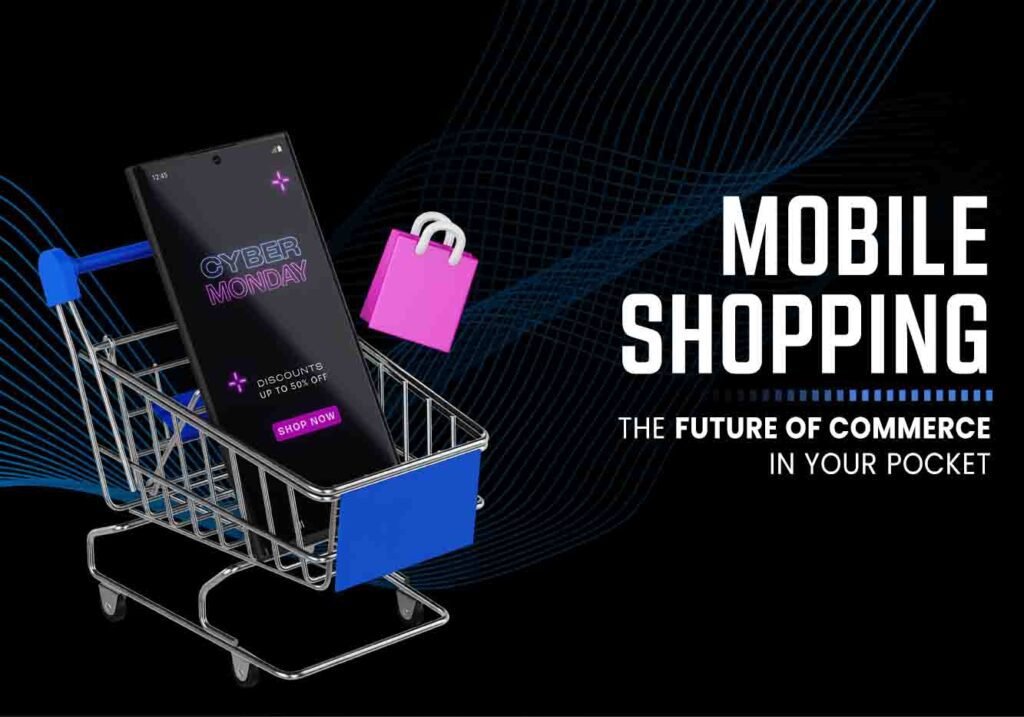The modern digitalized world is so fast-paced that shopping has taken a new dimension. Customers no longer need to visit physical shops or even sit down a computer, as they can now have the whole marketplace in their pockets. Mobile shopping, mobile commerce, or m-commerce has turned out to be the booming engine of e-commerce all over the world. With the rise of Ecommerce mobile trends, through an e-commerce mobile application development platform, utilize a mobile commerce website, or survey the newest offers on an American mobile shop, consumers are engaging with brands like never previously.
This blog combines insights from the latest industry reports on mobile ecommerce statistics, mobile commerce trends, and e-commerce technology trends, helping you understand what’s shaping the future of online shopping. We’ll also dive into the benefits, drawbacks, and examples of mobile commerce, along with answers to common FAQs.
What Is Mobile Commerce?
At its simplest, mobile commerce (often shortened to m-commerce) refers to buying and selling goods and services through wireless handheld devices such as smartphone and tablets. If e-commerce is about shopping online, then m-commerce takes that shopping experience into the palm of your hand.
So, what is a mobile commerce platform? It can be:
- A specific mobile trading application (e.g., Daraz, OLX, or Alibaba applications).
- An adaptable mobile commerce website that is smartphone optimized.
- An integrated system where apps and websites are compatible.
In essence, e-commerce vs mobile commerce is a matter of “where and how” customers shop. E-commerce happens on desktops, laptops, and mobile devices, while m-commerce focuses solely on mobile devices.
Why Mobile Shopping Matters Today
Mobile shopping is not just a convenience—it’s an economic powerhouse. With billions of people carrying smartphones, the mobile phone ecommerce market has exploded. The latest mobile commerce statistics show that more than 70% of all e-commerce traffic comes from mobile devices.
Some eye-opening m-commerce statistics include:
- $4.5 trillion global mobile commerce market by 2024 (Sellers Commerce report).
- 70–80% of online shoppers use mobile devices to research and purchase products.
- Using mobile ecommerce trends, voice search, AR/VR shopping, and social commerce are driving growth.
- Asia and North America. In North America and Asia, mobile commerce is growing rapidly, with the American mobile shop market being at the forefront in terms of personalization innovations.
It is evident that mobile shopping is not an option anymore; it is the future of online retail.
The Statistics Of Mobile E-commerce in 2025 And Beyond
Based on mobile commerce statistics at Netgury and TechAhead:
- 92 percent of users of the internet worldwide access the internet through mobile phones.
- It is estimated that by 2026, mobile commerce platforms will make up more than 70 percent of all e-commerce incomes globally.
- M-commerce e-commerce overlap will grow because retailers will create integrated experiences across platforms.
- Most mobile trends in e-commerce are driven by Gen Z and Millennials, who favor quick, personable, and secure mobile applications.
These statistics testify to the fact that consumer behavior keeps changing, and why companies should implement mobile commerce solutions to keep up with the times.
Major Mobile Commerce Trends You Simply Can Not Overlook
Mobile commerce is a dynamic area, and the area is defined by new trends of commerce each year. According to the joint blogs you gave, the most crucial m-commerce trends in 2025 and beyond are as follows:
- Mobile-First Shopping
Organisations are focusing on e-business and mobile business. A fast, intuitive, and engaging mobile commerce platform outperforms the traditional desktop-first variety.
- Integration of Social Commerce
Examples of mobile commerce are becoming popular apps such as Instagram, TikTok Tok and Facebook, where users can shop directly through social feeds.
- Voice Search and AI Assistance
Consumers use voice commands on Alexa, Siri, and Google Assistant to find and purchase products—a growing part of mobile e-commerce.
- AR Shopping
Augmented Reality is transforming the mobile commerce solution space by experimenting with furniture virtually, to testing lipstick shades, among others.
- Personalization Through AI
Predictive analytics is used to show the customers what they are most likely to purchase. Machine learning is becoming a more powerful force behind mobile commerce solutions.
- Seamless Payment Solutions
Mobile e-commerce apps are now full of digital wallets, one-click payments, and even cryptocurrencies.
- Increased Expectancy of Speedy Delivery
Same-day delivery is an increasing demand as the trend of mobile ecommerce is on the rise, and retailers have to modify their logistics.
Benefits of Mobile Commerce
So why are companies spending huge sums of money on mobile ecommerce statistics and solutions? The benefits are undeniable:
- Convenience: Customers make purchases at any place and at any time.
- Expansive Reach: Companies reach the entire world in real time.
- Individualized Experiences: Recommendations become customized through the use of data applications.
- More Engagement: Mobile applications make customers more engaged as compared to websites.
- Swifter Checkout: Mobile wallets make payments easier.
These benefits make mobile commerce via e-commerce a necessity for contemporary retailers
Disadvantages of Mobile Shopping
M-commerce, like any innovation, is fraught with difficulties:
- Security: There are issues of cyberattacks and data leakages.
- Technical Limitations: Mobile commerce sites, which are not designed well, irritate users.
- Always Connected: Shopping is hindered by a bad internet connection.
- High Competition: It is difficult to establish yourself in a world of thousands of apps.
When informed about this, businesses will be able to optimize their strategies for mobile commerce solutions.
Mobile Commerce in the Real World
To see how the mobile commerce statistics can be translated to real-world mobile commerce examples, let us look at the following:
- Daraz App – The world leader in mobile phone ecommerce with one-click buying, artificial intelligence (AI) based personalization and in-app games for rewards (gamified shopping)
- Foodpanda App– Enables customers to preorder and pay through the mobile wallets like Easypaisa, JazzCash.
- Sapphire / Khaadi / Outfitters Apps (AR for Fashion Shopping) – Adds AR to virtual try-ons, Virtual catalogues and navigation.
- AliExpress –An ideal commerce mobile illustration of global low-cost shopping.
- Localized telecom mobile commerce – Telecom providers in Pakistan have fully embraced mobile commerce:
- Jazz World App – Pay bills, buy bundles, recharge, manage account
- Easypaisa App – Full mobile wallet + mini ecommerce hub
- Zong & Ufone Apps – Self-care, offers, and localized promotions
Future of Mobile Shopping
Analysts say that mobile ecommerce is heading in the direction of a completely immersive, AI-controlled, and hyper-personalized future. Mobile shopping will continue to get more interactive as AR shopping, blockchain security, and 5G connectivity keep growing.
There will be no distinction between e-commerce and mobile commerce, and the customers will demand seamless solutions in the transition between the desktop, mobile, and physical stores. To businesses, this is not an option of investing in the advanced mobile commerce solutions but survival.
FAQs About Mobile Commerce
Q1: What are the three forms of mobile commerce?
The three main types are:
- Mobile shopping (purchasing services/products through applications or websites).
- Mobile banking (banking through mobile).
- Mobile payment (wallets such as Easy Paisa, Jazz Cash, and SadaPay).
Q2: What is mobile commerce growth?
Q3: What is the downside of mobile commerce?
Q4: What are the benefits of mobile commerce?
Q5: Is mobile commerce growing?
Conclusion
Mobile shopping has redefined the way we buy, sell, and interact with brands. With compelling mobile commerce statistics, innovative mobile commerce solutions, and evolving m-commerce trends, the future is clear: mobile is not just a part of e-commerce—it is e-commerce.
Businesses that embrace e-commerce mobile trends and invest in advanced e-commerce mobile application development will thrive. Those who hesitate risk being left behind in a world where commerce is increasingly mobile, fast, and personal.










